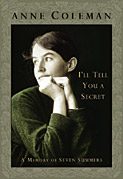Swimming in memory (Page 3)
Coleman's success as a writer, late as it is, probably would not surprise MacLennan, as he had predicted as much. "I think you are someone who will do something truly remarkable," he told her in 1957, but then he added a codicil: "I have a sense that you'll find being young hard and that your triumphs and greatest happiness will not come until you are middle-aged."
"It is rather a long time later," says Coleman wryly, searching for reasons to explain her delayed entrance onto the literary stage. She was a single mother for many years, leaving her first husband when her children were five and three. She then earned a Master's in English Literature from Bishop's University and taught for five years in Westmount, before heading west in 1970 to the University College of the Cariboo in Kamloops, B.C., where she remained until her retirement in 2000.
She also remarried but, as she notes, "I made a worse choice the second time," and she is once again single. Throughout, she says, "I wanted to have a certain kind of wonderful home, with the atmosphere my mother had created -- but that took a lot of energy."

Today, her children are "tickled" by their mother's late success, she says. Her son Paul is a veterinarian, living in Merritt, B.C., while her daughter Jane, a mathematician, is raising her family in Berkeley.
Added to her home responsibilities was another set of demands from work. "I was in a very sexist environment for my working days," she explains. "I was the first woman hired at the college, and the only feminist there for about 20 years."
Coleman had a high profile as a feminist in Kamloops, appearing frequently in the media and giving presentations on sexism and education in local schools. She also initiated a popular course on women and literature which consistently drew full enrolment; one year when the College decided not to offer it, a letter-writing campaign forced the administration to change its mind. So, while stressing that she made many friends among her colleagues in Kamloops, she says her contributions were often not taken seriously, and she was confronting a world in which she was an outsider.
"I didn't know at the time that it was affecting me creatively, but something was sort of shutting down. I believe now that I let it get to me in a way I didn't realize." But everything changed when she retired. "I had been scared, thinking, 'Who am I going to be after teaching for 35 years? What does it mean if I'm not a teacher?'" she recalls. "Then I discovered I'm a writer. There was a huge burst of confidence and energy."
Part of the burst was a first novel, which she insists will never see the light of day. She wrote a much longer memoir, also consigned to her desk drawer, but a fragment of this work formed the seed of I'll Tell You a Secret. Sometimes, however, creative energy must defer, at least briefly, to the demands of marketing, and in September she found herself trekking along the national book tour trail. "It doesn't feel real at all. It's hard to believe that my tiny thing has led to this," she says of the tour, "but it's fun."
Unfortunately, talking about one book has forced her to take a hiatus from writing the next, a novel, albeit with some resemblances to Coleman's life. It traces the histories of three women, who had been friends in university and find themselves reunited in another city decades later -- much like herself and two friends in her new home of Victoria, where she moved after retiring. "I'm focused, when I'm allowed to get at it, on this new work," she says, "so I really hope I can get back into it again."
Coleman wrote I'll Tell You a Secret in the summer of 2002 and, as she says in an epilogue, she found the key to memory through her body. "I hadn't swum so much so regularly since I was a young girl," she writes. "And now I find there is something mythic about the movements of swimming, the mystery of the dark, deep water beneath me..." As long as those depths are there to swim over and gaze into, Coleman will no doubt find plenty of energy and inspiration for her next chapters.


